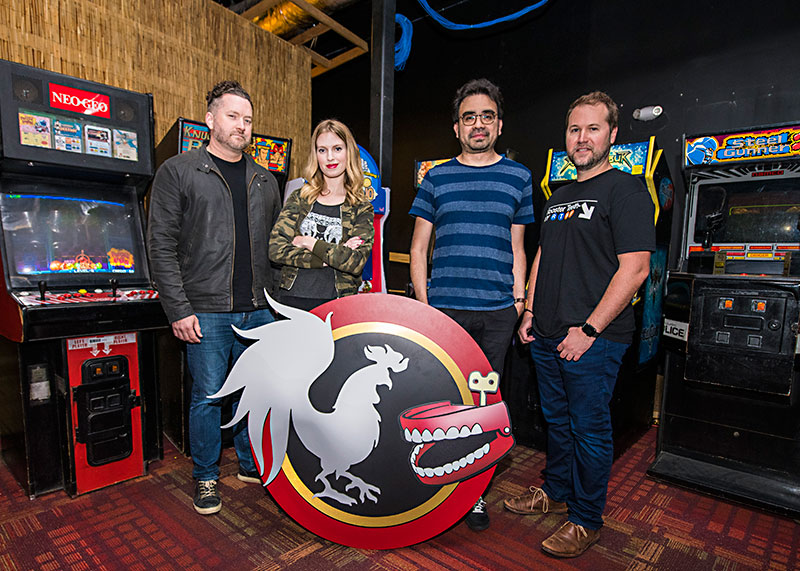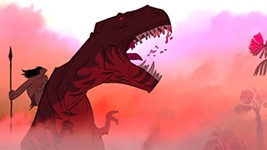How Rooster Teeth Became an Online Phenomenon
9.5 million YouTube subscribers can't be wrong
By Richard Whittaker, Fri., May 11, 2018

MySpace. Spike TV. Hooters Air. Trump Mortgage. All brands that launched with great uproar in 2003, all designed to change the world, all now gone from the popular imagination. But one alum of the class of '03 is still standing. Rooster Teeth, which started as funny videos riffing on the game Halo, is now Austin's biggest online content production house.
Rooster Teeth co-founder and CEO Matt Hullum lists those dead brands with a mix of pride, shock, and disbelief. After all, his underdog studio has been in the online video business since two years before YouTube, and predates Twitter and Facebook. "We've outlasted more changes in the industry than anyone conceivably should have been able," he said. "We're just fortunate that we've been able to keep doing this, and keep doing it our way, in the midst of everything else in the world getting redefined every couple of years."
So what's the "it" that Rooster Teeth does? It all started with Red vs. Blue, an online show where actors would write scenarios and create characters over game footage grabbed from a stack of interlinked Xboxes. The cast were Hullum and his friends, mostly UT alums, gathered in co-founder (now CCO) Burnie Burns' spare bedroom in Buda. Now it's one of the most recognizable online entertainment brands, producing dozens of shows and podcasts weekly. It's so big, it has its own dedicated conferences in Austin, London, and Sydney, and its performers and executives (who are still the same people) are household names in gamer culture. Putting it simply: 9.5 million YouTube subscribers can't be wrong.
"Cult" is a word bandied around a lot about Rooster Teeth. Hullum said, "People have always said 'Rooster Teeth is the best-kept secret in entertainment' a lot. We were always like, why is everyone keeping it a secret?" That's been a side effect of being in Austin, away from the coastal-centric entertainment media. But that lack of coverage has not outweighed the benefits of setting up shop in a city "where people are a little more open to trying things that they may not understand that still sound cool."
It wasn't until the annual RTX festival started selling out Downtown hotels annually, Burns said, "that the city of Austin goes, 'Who are you guys?' It was literally a conversation with them, that we'd been here for 10 years, and nobody in Austin really knew about us."
For longtime RT talent and producer Gus Sorola, that was a pivotal moment, but he had his own indicator of success. "When people started complaining in the Austin subreddit about parking and crowds around RTX, I went, 'We've made it! Our event is officially annoying to someone on the internet.'"
Barbara Dunkelman, the studio's community manager, doesn't compare Rooster Teeth in 2018 to another media outlet. Instead, it's like a cool older sibling, the one who shares their games and toys and clues you into what's fun. "We want to be your best friend. We want to be a place where people can laugh, and find people who are like-minded."
After 15 years of internet video, the team has taken an opportunity to look back, even filming a documentary, Why We're Here (the title a spoof on a line from the first episode of Red vs. Blue). Initially, the company developed slowly, taking eight years to expand from the original five to only around 30. Yet recent growth has been exponential: Now it has 350 full-time employees, including a large animation department. They're the biggest single permanent tenant at Austin Studios, with production space, studios, offices, and even a prop fabrication workshop and warehouse. That's where they have shot not only multiple series, but also three feature films. Comparing the early days to now, Hullum said, "The two eras are pretty remarkably different." But how would he sum up the first 15 years overall? "Perfect execution. At every level."
Burns and Sorola laugh hard at that idea. Along with Hullum, Geoff Ramsey, and Joel Heyman, they're referred to as the founders, the five constants in the company since those early cramped days. Back then, the internal roles could be pretty loosely defined – everyone did a little bit of everything, and that's carried on to this day, where even the executives still voice characters on shows, or direct, or produce. However, this wasn't some hobby that turned into a business. "This was five people quitting their jobs," Burns said.
Not just quitting jobs, but careers. Burns, Ramsey, and Sorola were IT professionals in Austin, and Heyman and Hullum were in Los Angeles, working as an actor and a VFX artist respectively, and they all quit before anyone knew how to make money off the internet. This was also well before there was any money to be made from online advertising – or before online advertising was really even a thing. So they pioneered, or were early adopters of, so many aspects of internet business – selling subscriptions, online merch sales (per Burns, “T-shirts were the currency of the early internet”), crowdfunding DVD releases – but there were no guarantees.
Sorola famously was so unconvinced that it would be a success that he thought he could just phone in, and so he briefly moved to Puerto Rico. “I’ve been wrong about a few things in my life,” he admitted. “I was wrong about the web. I said that nobody would ever want to use a graphical interface to navigate the internet. I was like, ‘Us using [web browser] Mosaic is a mistake, it’s a step backwards.’”It’s easy to forget how much of a risk they were taking. In 2003, Burns said, “Web video was somewhere below home video, but we had a lot of faith in the model.”
Hullum agreed. "One of the things we've been most successful in over the years is just maintaining a consistent identity. Especially entertainment brands, there's a lot that go 15 years and lose their way, or become something that they didn't want to be because of trends. We've tried really hard to be aesthetically and culturally consistent over the years."
A key decision that helped Rooster Teeth survive the early days was simple: remain platform agnostic. The simple logic is that it's impossible to predict what future tech will actually look like. If they'd tied themselves to MySpace, or Zune, they'd be long-forgotten. For context, Burns referenced a classic of near-future speculative fiction. "You go back and watch Robocop, and they have this device they use to track Robocop." That tracking mechanism looks like a brick with an LED, it only does one thing, and it's three times the size of a modern cell phone. "They couldn't fake what I have in my pocket."
"They wouldn't have understood it," added Sorola. Nor would they have understood Rooster Teeth, and that was a benefit of being in Austin, off the conventional media radar, away from TV networks and corporate intrusion. "What was important was doing it ourselves, not having to worry about what a distributor thinks about it, and we have that direct connection with the fans and the audience. Instead of having someone in the middle obstructing that process, we were very hands-on and direct."
Not being part of a larger corporate entity in those early days also meant they were completely in charge of the product. If a show got the green light, then it was going to air. There was no dealing with TV companies and movie distributors, no slicing and dicing of international rights distributors, no geoblocking. Burns said, “From day one, we were a global business, and distributing our entertainment content around the world, to anyone who wanted to watch it. By the tenth year of the company, we had this huge global following, and we were already going to events in London and Europe.”
Traditional media has a lousy track record of understanding technology, but especially of understanding gaming culture. Even blockbuster films get more respect: that's why Avengers: Infinity War gets New Yorker think pieces, and God of War doesn't. When they have tried, Burns said, "It's always seemed so much like pandering." It's the old cliched depiction of gamers as teens on their parents' couch: "It's like if they'd show people going to movies, and people standing on the seats and throwing popcorn at each other. Nobody does this. So gamers were very cynical about being pandered to for a long period of time, and so a genuine voice is really important to them."
Rooster Teeth's massive niche has come from talking to gamers as fellow gamers – not just about games, but through the language and lens of gamer culture. The product may often be irreverent, but it's never amateurish. Sorola said, "That's how we started, is we thought, 'We're going to do stuff we like. Maybe it's not the most popular thing, but surely there's enough people who think the same way we do that are going to find this enjoyable, and it's going to be sustainable.' It was just a larger slice of people than we expected."
That was the other pivotal decision: putting community first. A key part of the original website design was forums that the team used as much as the fans, and that's why fans don't see Chief Creative Officer Burnie Burns, or CEO Matt Hullum. They're Burnie and Matt. They're the people who play the same games as them, like the same shows as them. They are them – often quite literally – and if Burns et al. are the cool older brothers, then Dunkelman is the cool big sister. She got to know the founders through volunteering at unofficial fan events in Canada. After graduating college in 2011, she said, "Burnie reached out to me and said, 'We're trying to find a position for you here, since we really like working with you, and we think you're a good fit.'" So the fan liaison to the studio became the studio's liaison to the fans, and she became their community manager. That's a bigger role than just drafting press releases and sending the odd tweet. Dunkelman is a real and engaged presence on RoosterTeeth.com's forums. "We like having conversations with our community, not just promoting things and pushing things out there and ignoring the response."
While she may be the only community manager in any firm with her own action figure and range of T-shirts, the bulk of her work week is still outreach. With so much content, and so many fans, “It’s challenging, that’s for sure,” she said. “People are spread out over so many different social platforms, so it’s not just our site anymore.” However, while keeping up with tech trends is important, “One of the best lessons I ever learned was ‘sleep on it.’ Because if you react right away, it came be something you regret saying, and that has bit me in the ass a couple of times.” It can also be a matter of perspective. While it’s always nice to read nice comments, and get positive and positively framed (even if it’s critical) feedback, “negative comments will exist, but they are so very few of them. If you think about it on a large scale, a video has 400,000 views, then 300 comments, and 10 of those are really negative. Out of 400,000 people, 10 people are being jerks about it, so it’s an extremely small scale.” Even then, “some people are just trolling, or they’re going through something in their lives … you don’t want to make excuses for people being mean on the internet, but you have to take it with a grain of salt.”
Dunkelman still holds that managerial position, in addition to (in classic Rooster Teeth fashion) hosting the health and relationship podcast Always Open, and voicing Yang in their smash-hit American anime RWBY. "I actually think that's one of the things that makes Rooster Teeth special," she said. "There's always the question, 'This person who was on the podcast, what do they do at the company?' Because there's no one at the company who is just someone who is on-camera talent. Everyone has multiple jobs, and is multifaceted, and I think that's why the audience has gravitated towards us, because they think we've earned our place."
That fan loyalty has helped Rooster Teeth earn its place in the entertainment industry, which is now coming to it, and on Rooster Teeth's terms. When it was acquired by digital entertainment firm Fullscreen Media in 2014, the streaming services giant left it basically untouched, bar pumping in finances. When YouTube launched its subscription service YouTube Red in 2015, its first original film was Lazer Team – a Rooster Teeth original, starring Burns, directed by Hullum, and funded to the tune of $2.5 million by fans through Indiegogo. They've been ahead of the pack for years – the show Achievement Hunter helped popularize watching gamers playing games three years before Twitch even launched – and they're still working on how to lead the field. There's a VR rig in Sorola's office, as they start to examine how that tech fits into their model, and retain that undefinable, you-know-it-when-it-happens, Rooster Teeth feel.
Fortunately, that massive, engaged audience provides a supportive sounding board. It's not always easy: Witness the backlash when they switched from offering shows as downloadable files to streaming in Flash. Yet, Burns said, "I always say, the internet demands progress, but the internet hates change. But it's all those little changes that people go crazy about, and they're outraged about, those are what eventually come together and make progress."









